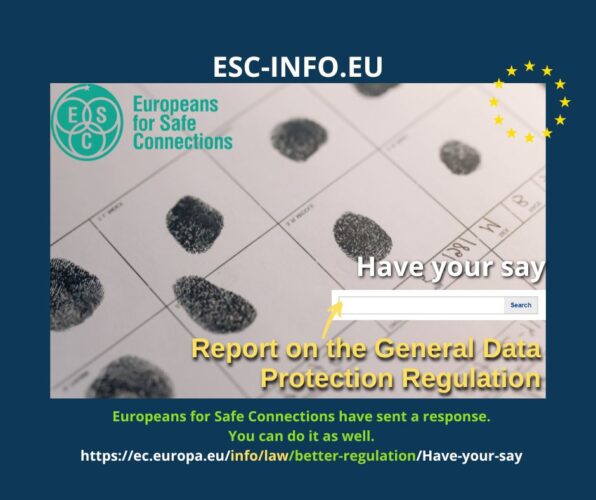
Have your say – GDPR
You can also get involved in forming EU laws. The European Commission offers a platform “Have your say” with the list of all new EU initiatives open for public consultation. You need to register to write your feedback: ec.europa.eu/info/law/better-regulation/have-your-say
Report on the General Data Protection Regulation
About this initiative: The General Data Protection Regulation is the main piece of EU legislation guaranteeing the fundamental right to data protection. It sets out the rights of individuals and imposes obligations on organisations and businesses that process the personal data of people in the EU.
This initiative will report on how the rules have been applied, 6 years after their entry into application. It will build on the report that was published in 2020.
Feedback period: for stage 2 it is 11 January 2024 – 08 February 2024
Feedback from Europeans for Safe Connections
We “Europeans for Safe Connections” would like to provide our experience on how the GDPR rules have been applied during 6 years and also some suggestions for improvements.
1. Is Personal Data Protection Sufficient?
We are all data for sale. Data brokers are amassing billions and trillions of data points worldwide and are creating massive personalized digital profiles about each of us. Our personal details are sold for advertising, influencing, tracking or surveillance purposes.
Our privacy is compromised. The introduction of Smart cities, buildings and devices promises comfort and security, but will cost us our privacy and will increase surveillance immensely.
SOLUTION: Launch an impact assessment of the effects of 5G, including connected objects and bodies, on personal data protection and evaluate compliance against current data protection laws
We call for such assessment to be conducted regularly, every year, and for each EU member state. This requires amending Article 35 of the GDPR on the basis of Article 16 of the TFEU, so that this type of impact assessment can be initiated at the level of EU member states, at the request of a third party.
Read more: https://signstop5g.eu/en/solutions/protection-of-our-data/proposal-19
2. Is Wireless Data Transmission Secure?
Wireless transmissions from credit cards, connected cars, mobile phones, smart watches, fitness trackers, pacemakers and personal wearables pose a risk of data misuse. Hacking of medical devices could create a backdoor into hospital networks.
Users themselves contribute to privacy and device security breaches as they are not aware of different threats and vulnerability of the devices. Minimization of data transmitted wirelessly is crucial for the security of medical patients.
SOLUTION: Protect citizens against the increasing vulnerability to cybercrime by applying the principle of data minimization to collection via wireless (such as medical and banking data).
Read more: https://signstop5g.eu/en/solutions/protection-of-our-data/proposal-20
3. Discrimination
The GDPR clearly mentions cases of discrimination as falling within the competence of supervisory authorities. But data protection authorities (national and European Data Protection Board – EDPB) do not provide assessments of discrimination and digital rights violations. Moreover, they are not sufficiently independent of the States and companies, do not have sufficient resources of their own and their scope of control remains limited.
Current data protection is insufficient in an Internet of Bodies and Things scenario in which all devices are collecting our data 24/7, to be processed as Big Data by artificial intelligence which has been proven to reproduce and aggravate discrimination.
SOLUTION: Ensure the EDPB fight actively and independently against discrimination and digital rights violations. Provide the EDPB and each national data protection authority with sufficient funding and human resources. Make them free of conflicts of interest so that they can independently investigate and sanction digital rights violations. We therefore request that in the GDPR, the requirements for the composition of DPAs be formalized to ensure their independence from both the collecting structures and the States.
Read more: https://signstop5g.eu/en/solutions/protection-of-our-data/proposal-21
4. Is Artificial Intelligence supporting us?
AI is a good servant but a bad master. AI reproduces and aggravates discrimination. Every second, millions of predictions of human behavior are made by corporations on the basis of the data collected. In an Internet of Bodies and Things scenario all devices are collecting our data 24/7, to be processed as Big Data by AI.
Various studies have shown that AI actually automatically reproduces previous discrimination in machine learning processes. The machine “learns” according to the choices it has already made in the past by systematising them. AI can then multiply these prejudices and opinions and forward political extreme positions – therefore AI is a powerful engine for reproducing and aggravating discrimination.
Therefore, automated procedures should be allowed only after each individual citizen’s explicit consent.
SOLUTION: Require each citizen’s explicit consent in order to subject their data to any automated procedure. According to Article 5-1 of the GDPR, personal data processed must be “relevant and limited to what is necessary for the purposes for which they are processed“. AI on the 5G network will collect data continuously, which goes against this principle of data minimisation.
Read more: https://signstop5g.eu/en/solutions/protection-of-our-data/proposal-22
Best regards
Europeans for Safe Connections
This feedback was sent from a wired internet connection
– No use of harmful radiation
– Less electricity consumption
– Increased data security
Link to our feedback: https://ec.europa.eu/info/law/better-regulation/have-your-say/initiatives/14054-Report-on-the-General-Data-Protection-Regulation/F3452552_en

Facebook post available for sharing: https://www.facebook.com/permalink.php?story_fbid=372391092194721&id=100082714988907



